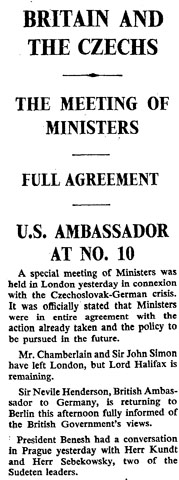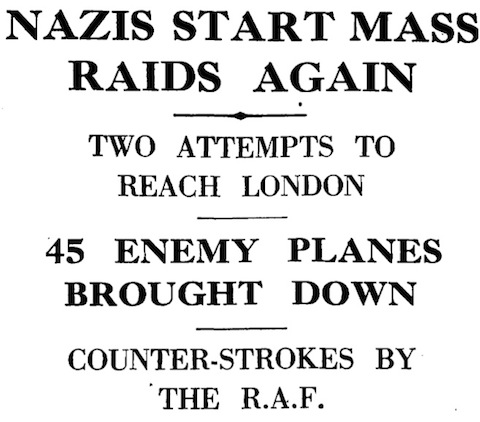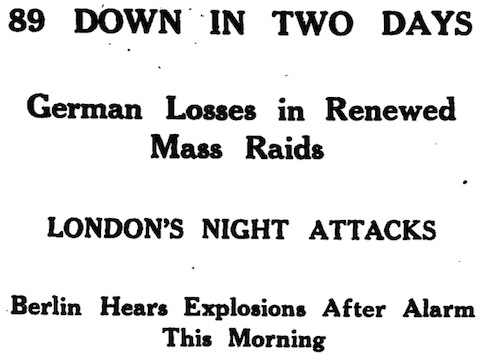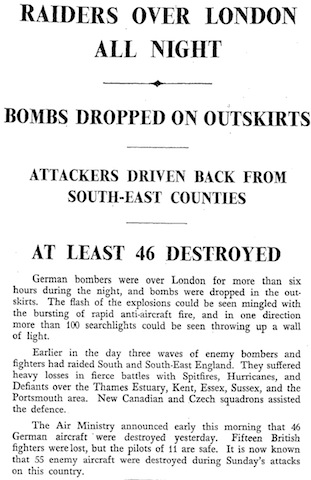Since May, the Home Intelligence Department of the Ministry of Information has been preparing daily reports on the state of British morale: what people are talking about, what they are worried about, what they are happy about, and what are thought the government should do. A wide variety of sources is used for this, both formal and informal: BBC listener surveys, Mass-Observation reporters (AKA ‘Cooper’s snoopers’), overheard conversations on buses or in pubs, gossip from friends and relatives. Each region of the country has its own information office which sends data in to London; and London itself has a more extensive (but still somewhat informal) network of informants reporting on what is going on in their part of town. The resulting reports are, of course, secret.
Today’s report begins with the following general remarks:
Morale is much the same today although a good many people in the London area are suffering from the effects of loss of sleep as a result of the raids during the last few nights.
There has been no noticeable increase in the number of people carrying gas masks, and the fear of invasion seems to have receded.
The air war remains the chief topic of conversation and the optimistic faith in the RAF is still the highest common factor of conversation. There are, however, complaints that we are not doing enough in the way of bombing Berlin objectives, and there is a demand that Berlin should be bombed yet more heavily.
There then follow ‘points from regions’, of which I can only give a sample. From the Northern region (office in Newcastle) come complaints from people who earn just too much to get a free Anderson shelter (meaning about £250 a year). Air raids in Leicestershire have ‘stiffened morale’. In Bristol, people are now so blasé about air raids that they rarely head for shelter when alerts sound. Scottish academic and professional types are reported to be unhappy with the way the weekend raids were reported, which give the impression that much damage was done.
There is some nervousness in the Shetlands, due to the fact that these islands are nearer than the rest of Great Britain to Norway, where invasion preparations are said to be in progress; there are also rumours that several mail planes have been shot down, which produces a feeling of isolation, and there are rumours of Fifth Columnists in the labour camps.
The report closes with a much more extensive section on London, much of it concerned with conditions in the shelters. For example, an observer reports from ‘public shelters in poor crowded districts’ that the harsh lighting and noise ‘upsets children who cry and fray people’s nerves’, and that many shelterers don’t bring enough ‘protection against cold and concrete floors’. But then there places like the West End, where the members of an ‘Evening Institute’ are more worried about the overzealous internment of enemy aliens, especially refugees, and the lowbrowness of the BBC light entertainment. There is a long quote from a ‘Greenwich contact’:
congregations of people without shelter gather at either end of river subway, which is closed during air raids; women in shelters singing to drown noise of HE bombs; men standing outside shelters but big bang hurried them inside; tram men refuse to drive during raids — general opinion expressed that communications should cease during raids, and night facilities be available afterwards to convey marooned people home from central London.
In Richmond, factory girls are raffling tickets in support of the Spitfire fund. In Harrow, an official reports that the ‘destitute awaiting money after raids’ are very cheerful: ‘Great neighbourliness evident’. The war is mixed with mundane concerns:
Hackney contact reports: appreciation of Hilton’s talks; belief that US may yet enter war; worry at increased costs of gas and electricity.
The Home Intelligence reports don’t necessarily represent the ‘real’ story of what is going on in Britain: they are more impressionistic than systematic, have their own concerns and biases, and are more disposed to pick up on bad news than good. But that last at least provides some correction to the somewhat rosy picture painted by the press.
Source: Paul Addison and Jeremy A. Crang, eds, Listening to Britain: Home Intelligence Reports on Britain’s Finest Hour, May to September 1940 (London: The Bodley Head, 2010).
![]() This work is licensed under a Creative Commons Attribution-NonCommercial-NoDerivatives 4.0 International License.
Permissions beyond the scope of this license may be available at http://airminded.org/copyright/.
This work is licensed under a Creative Commons Attribution-NonCommercial-NoDerivatives 4.0 International License.
Permissions beyond the scope of this license may be available at http://airminded.org/copyright/.





